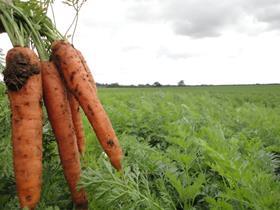
Growth in the overall organic market accelerated over the past year growing by an “exceptional” 7.1 per cent while fresh produce has seen double-digit sales growth.
The new figures were released today (21 February) as part of the Soil Association’s annual Organic Market Report.
While growth has been steady over the past five years, sales have grown faster this year in part down to strong performances in the multiple retailers, which in many cases have increased organic ranges and backed innovation.
The report comes amid uncertainty for the organic and wider food market due to Brexit, but speakers at the launch in central London today said the sector may be more secure than conventional due to lower input costs, at a time when costs are on an upward trend.
“This year for the first time in several years, growth has come from the supermarkets as well as other channels,” said Soil Association director of business development, Claire McDermott.
“An increased range has driven this growth. Sainsbury’s still has the largest market share, while Ocado has three times as many organic products as any other.
“The gap in sales growth between non organic and organic is widening. This is being driven by innovation, as well as new routes to market, such as Amazon Fresh, which although starting from a small base offers a new shop window for organics.”
The strongest area of growth for organics is in catering and foodservice (+19.1 per cent), followed by home delivery and box schemes (+10.5 per cent) and supermarkets (+6.1 per cent). Other areas of the sector such as beauty, wellbeing and textiles are also seeing double-digit growth as consumers increasingly opt for an organic lifestyle and move from food into other products.
Fresh produce has a 23.5 per cent share of the organic market, up 10.3 per cent on last year, with fresh fruit having grown significantly (+17 per cent), as well as organic carrots (+15 per cent) and organic bananas (+9 per cent).
“The industry now needs one single articulated message about what organic means, such as what Fairtrade has achieved,” said McDermott. “If we do this we will get more availability, and we see already that when ranges are bigger, people buy more.”
Concerns over organic supply chain
The amount of organic land in the UK has declined by five per cent during the last year, although the number of applications to convert to organic is rising.
Speaking at the launch, chair of the Organic Trade Board Adrian Blackshaw, said: “My concern is the supply chain. Apart from the vertically integrated organic brands such as Yeo Valley, is there a sense that other banks, apart from [report sponsor] Triodos, are not supporting investment into organic land?’
A representative from milk processor Arla said there is a “ceiling” on producers’ organic ambitions due to Brexit, and said the rate of conversion should be higher, while another independent organic retailer warned against using overseas organic suppliers to fill gaps as it counters the current trend for buying local.
But McDermott said the key is a clear route to market for organic products, and companies are strengthening their supply chains to prepare for this growth.
She said: “The big challenge is cost. We need to find a way too support the cost throughout the supply chain. We think organics may be more secure than other areas due to lower input costs, which are rising post Brexit, but there is still much uncertainty. What really helps is seeing these growth rates in the sector.”



